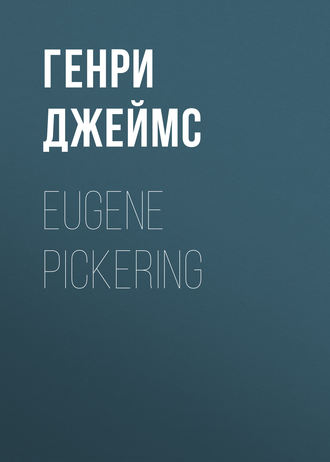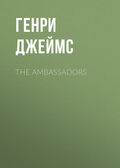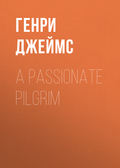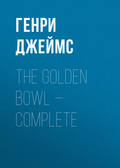
Генри Джеймс
Eugene Pickering
CHAPTER I
It was at Homburg, several years ago, before the gaming had been suppressed. The evening was very warm, and all the world was gathered on the terrace of the Kursaal and the esplanade below it to listen to the excellent orchestra; or half the world, rather, for the crowd was equally dense in the gaming-rooms around the tables. Everywhere the crowd was great. The night was perfect, the season was at its height, the open windows of the Kursaal sent long shafts of unnatural light into the dusky woods, and now and then, in the intervals of the music, one might almost hear the clink of the napoleons and the metallic call of the croupiers rise above the watching silence of the saloons. I had been strolling with a friend, and we at last prepared to sit down. Chairs, however, were scarce. I had captured one, but it seemed no easy matter to find a mate for it. I was on the point of giving up in despair, and proposing an adjournment to the silken ottomans of the Kursaal, when I observed a young man lounging back on one of the objects of my quest, with his feet supported on the rounds of another. This was more than his share of luxury, and I promptly approached him. He evidently belonged to the race which has the credit of knowing best, at home and abroad, how to make itself comfortable; but something in his appearance suggested that his present attitude was the result of inadvertence rather than of egotism. He was staring at the conductor of the orchestra and listening intently to the music. His hands were locked round his long legs, and his mouth was half open, with rather a foolish air. “There are so few chairs,” I said, “that I must beg you to surrender this second one.” He started, stared, blushed, pushed the chair away with awkward alacrity, and murmured something about not having noticed that he had it.
“What an odd-looking youth!” said my companion, who had watched me, as I seated myself beside her.
“Yes, he is odd-looking; but what is odder still is that I have seen him before, that his face is familiar to me, and yet that I can’t place him.” The orchestra was playing the Prayer from Der Freischütz, but Weber’s lovely music only deepened the blank of memory. Who the deuce was he? where, when, how, had I known him? It seemed extraordinary that a face should be at once so familiar and so strange. We had our backs turned to him, so that I could not look at him again. When the music ceased we left our places, and I went to consign my friend to her mamma on the terrace. In passing, I saw that my young man had departed; I concluded that he only strikingly resembled some one I knew. But who in the world was it he resembled? The ladies went off to their lodgings, which were near by, and I turned into the gaming-rooms and hovered about the circle at roulette. Gradually I filtered through to the inner edge, near the table, and, looking round, saw my puzzling friend stationed opposite to me. He was watching the game, with his hands in his pockets; but singularly enough, now that I observed him at my leisure, the look of familiarity quite faded from his face. What had made us call his appearance odd was his great length and leanness of limb, his long, white neck, his blue, prominent eyes, and his ingenuous, unconscious absorption in the scene before him. He was not handsome, certainly, but he looked peculiarly amiable and if his overt wonderment savoured a trifle of rurality, it was an agreeable contrast to the hard, inexpressive masks about him. He was the verdant offshoot, I said to myself, of some ancient, rigid stem; he had been brought up in the quietest of homes, and he was having his first glimpse of life. I was curious to see whether he would put anything on the table; he evidently felt the temptation, but he seemed paralysed by chronic embarrassment. He stood gazing at the chinking complexity of losses and gains, shaking his loose gold in his pocket, and every now and then passing his hand nervously over his eyes.
Most of the spectators were too attentive to the play to have many thoughts for each other; but before long I noticed a lady who evidently had an eye for her neighbours as well as for the table. She was seated about half-way between my friend and me, and I presently observed that she was trying to catch his eye. Though at Homburg, as people said, “one could never be sure,” I yet doubted whether this lady were one of those whose especial vocation it was to catch a gentleman’s eye. She was youthful rather than elderly, and pretty rather than plain; indeed, a few minutes later, when I saw her smile, I thought her wonderfully pretty. She had a charming gray eye and a good deal of yellow hair disposed in picturesque disorder; and though her features were meagre and her complexion faded, she gave one a sense of sentimental, artificial gracefulness. She was dressed in white muslin very much puffed and filled, but a trifle the worse for wear, relieved here and there by a pale blue ribbon. I used to flatter myself on guessing at people’s nationality by their faces, and, as a rule, I guessed aright. This faded, crumpled, vaporous beauty, I conceived, was a German—such a German, somehow, as I had seen imagined in literature. Was she not a friend of poets, a correspondent of philosophers, a muse, a priestess of æsthetics—something in the way of a Bettina, a Rahel? My conjectures, however, were speedily merged in wonderment as to what my diffident friend was making of her. She caught his eye at last, and raising an ungloved hand, covered altogether with blue-gemmed rings—turquoises, sapphires, and lapis—she beckoned him to come to her. The gesture was executed with a sort of practised coolness, and accompanied with an appealing smile. He stared a moment, rather blankly, unable to suppose that the invitation was addressed to him; then, as it was immediately repeated with a good deal of intensity, he blushed to the roots of his hair, wavered awkwardly, and at last made his way to the lady’s chair. By the time he reached it he was crimson, and wiping his forehead with his pocket-handkerchief. She tilted back, looked up at him with the same smile, laid two fingers on his sleeve, and said something, interrogatively, to which he replied by a shake of the head. She was asking him, evidently, if he had ever played, and he was saying no. Old players have a fancy that when luck has turned her back on them they can put her into good-humour again by having their stakes placed by a novice. Our young man’s physiognomy had seemed to his new acquaintance to express the perfection of inexperience, and, like a practical woman, she had determined to make him serve her turn. Unlike most of her neighbours, she had no little pile of gold before her, but she drew from her pocket a double napoleon, put it into his hand, and bade him place it on a number of his own choosing. He was evidently filled with a sort of delightful trouble; he enjoyed the adventure, but he shrank from the hazard. I would have staked the coin on its being his companion’s last; for although she still smiled intently as she watched his hesitation, there was anything but indifference in her pale, pretty face. Suddenly, in desperation, he reached over and laid the piece on the table. My attention was diverted at this moment by my having to make way for a lady with a great many flounces, before me, to give up her chair to a rustling friend to whom she had promised it; when I again looked across at the lady in white muslin, she was drawing in a very goodly pile of gold with her little blue-gemmed claw. Good luck and bad, at the Homburg tables, were equally undemonstrative, and this happy adventuress rewarded her young friend for the sacrifice of his innocence with a single, rapid, upward smile. He had innocence enough left, however, to look round the table with a gleeful, conscious laugh, in the midst of which his eyes encountered my own. Then suddenly the familiar look which had vanished from his face flickered up unmistakably; it was the boyish laugh of a boyhood’s friend. Stupid fellow that I was, I had been looking at Eugene Pickering!
Though I lingered on for some time longer he failed to recognise me. Recognition, I think, had kindled a smile in my own face; but, less fortunate than he, I suppose my smile had ceased to be boyish. Now that luck had faced about again, his companion played for herself—played and won, hand over hand. At last she seemed disposed to rest on her gains, and proceeded to bury them in the folds of her muslin. Pickering had staked nothing for himself, but as he saw her prepare to withdraw he offered her a double napoleon and begged her to place it. She shook her head with great decision, and seemed to bid him put it up again; but he, still blushing a good deal, pressed her with awkward ardour, and she at last took it from him, looked at him a moment fixedly, and laid it on a number. A moment later the croupier was raking it in. She gave the young man a little nod which seemed to say, “I told you so;” he glanced round the table again and laughed; she left her chair, and he made a way for her through the crowd. Before going home I took a turn on the terrace and looked down on the esplanade. The lamps were out, but the warm starlight vaguely illumined a dozen figures scattered in couples. One of these figures, I thought, was a lady in a white dress.
I had no intention of letting Pickering go without reminding him of our old acquaintance. He had been a very singular boy, and I was curious to see what had become of his singularity. I looked for him the next morning at two or three of the hotels, and at last I discovered his whereabouts. But he was out, the waiter said; he had gone to walk an hour before. I went my way, confident that I should meet him in the evening. It was the rule with the Homburg world to spend its evenings at the Kursaal, and Pickering, apparently, had already discovered a good reason for not being an exception. One of the charms of Homburg is the fact that of a hot day you may walk about for a whole afternoon in unbroken shade. The umbrageous gardens of the Kursaal mingle with the charming Hardtwald, which in turn melts away into the wooded slopes of the Taunus Mountains. To the Hardtwald I bent my steps, and strolled for an hour through mossy glades and the still, perpendicular gloom of the fir-woods. Suddenly, on the grassy margin of a by-path, I came upon a young man stretched at his length in the sun-checkered shade, and kicking his heels towards a patch of blue sky. My step was so noiseless on the turf that, before he saw me, I had time to recognise Pickering again. He looked as if he had been lounging there for some time; his hair was tossed about as if he had been sleeping; on the grass near him, beside his hat and stick, lay a sealed letter. When he perceived me he jerked himself forward, and I stood looking at him without introducing myself—purposely, to give him a chance to recognise me. He put on his glasses, being awkwardly near-sighted, and stared up at me with an air of general trustfulness, but without a sign of knowing me. So at last I introduced myself. Then he jumped up and grasped my hands, and stared and blushed and laughed, and began a dozen random questions, ending with a demand as to how in the world I had known him.
“Why, you are not changed so utterly,” I said; “and after all, it’s but fifteen years since you used to do my Latin exercises for me.”
“Not changed, eh?” he answered, still smiling, and yet speaking with a sort of ingenuous dismay.
Then I remembered that poor Pickering had been, in those Latin days, a victim of juvenile irony. He used to bring a bottle of medicine to school and take a dose in a glass of water before lunch; and every day at two o’clock, half an hour before the rest of us were liberated, an old nurse with bushy eyebrows came and fetched him away in a carriage. His extremely fair complexion, his nurse, and his bottle of medicine, which suggested a vague analogy with the sleeping-potion in the tragedy, caused him to be called Juliet. Certainly Romeo’s sweetheart hardly suffered more; she was not, at least, a standing joke in Verona. Remembering these things, I hastened to say to Pickering that I hoped he was still the same good fellow who used to do my Latin for me. “We were capital friends, you know,” I went on, “then and afterwards.”
“Yes, we were very good friends,” he said, “and that makes it the stranger I shouldn’t have known you. For you know, as a boy, I never had many friends, nor as a man either. You see,” he added, passing his hand over his eyes, “I am rather dazed, rather bewildered at finding myself for the first time—alone.” And he jerked back his shoulders nervously, and threw up his head, as if to settle himself in an unwonted position. I wondered whether the old nurse with the bushy eyebrows had remained attached to his person up to a recent period, and discovered presently that, virtually at least, she had. We had the whole summer day before us, and we sat down on the grass together and overhauled our old memories. It was as if we had stumbled upon an ancient cupboard in some dusky corner, and rummaged out a heap of childish playthings—tin soldiers and torn story-books, jack-knives and Chinese puzzles. This is what we remembered between us.
He had made but a short stay at school—not because he was tormented, for he thought it so fine to be at school at all that he held his tongue at home about the sufferings incurred through the medicine-bottle, but because his father thought he was learning bad manners. This he imparted to me in confidence at the time, and I remember how it increased my oppressive awe of Mr. Pickering, who had appeared to me in glimpses as a sort of high priest of the proprieties. Mr. Pickering was a widower—a fact which seemed to produce in him a sort of preternatural concentration of parental dignity. He was a majestic man, with a hooked nose, a keen dark eye, very large whiskers, and notions of his own as to how a boy—or his boy, at any rate—should be brought up. First and foremost, he was to be a “gentleman”; which seemed to mean, chiefly, that he was always to wear a muffler and gloves, and be sent to bed, after a supper of bread and milk, at eight o’clock. School-life, on experiment, seemed hostile to these observances, and Eugene was taken home again, to be moulded into urbanity beneath the parental eye. A tutor was provided for him, and a single select companion was prescribed. The choice, mysteriously, fell on me, born as I was under quite another star; my parents were appealed to, and I was allowed for a few months to have my lessons with Eugene. The tutor, I think, must have been rather a snob, for Eugene was treated like a prince, while I got all the questions and the raps with the ruler. And yet I remember never being jealous of my happier comrade, and striking up, for the time, one of those friendships of childhood. He had a watch and a pony and a great store of picture-books, but my envy of these luxuries was tempered by a vague compassion which left me free to be generous. I could go out to play alone, I could button my jacket myself, and sit up till I was sleepy. Poor Pickering could never take a step without asking leave, or spend half an hour in the garden without a formal report of it when he came in. My parents, who had no desire to see me inoculated with importunate virtues, sent me back to school at the end of six months. After that I never saw Eugene. His father went to live in the country, to protect the lad’s morals, and Eugene faded, in reminiscence, into a pale image of the depressing effects of education. I think I vaguely supposed that he would melt into thin air, and indeed began gradually to doubt of his existence, and to regard him as one of the foolish things one ceased to believe in as one grew older. It seemed natural that I should have no more news of him. Our present meeting was my first assurance that he had really survived all that muffling and coddling.
I observed him now with a good deal of interest, for he was a rare phenomenon—the fruit of a system persistently and uninterruptedly applied. He struck me, in a fashion, as certain young monks I had seen in Italy; he had the same candid, unsophisticated cloister face. His education had been really almost monastic. It had found him evidently a very compliant, yielding subject; his gentle affectionate spirit was not one of those that need to be broken. It had bequeathed him, now that he stood on the threshold of the great world, an extraordinary freshness of impression and alertness of desire, and I confess that, as I looked at him and met his transparent blue eye, I trembled for the unwarned innocence of such a soul. I became aware, gradually, that the world had already wrought a certain work upon him and roused him to a restless, troubled self-consciousness. Everything about him pointed to an experience from which he had been debarred; his whole organism trembled with a dawning sense of unsuspected possibilities of feeling. This appealing tremor was indeed outwardly visible. He kept shifting himself about on the grass, thrusting his hands through his hair, wiping a light perspiration from his forehead, breaking out to say something and rushing off to something else. Our sudden meeting had greatly excited him, and I saw that I was likely to profit by a certain overflow of sentimental fermentation. I could do so with a good conscience, for all this trepidation filled me with a great friendliness.
“It’s nearly fifteen years, as you say,” he began, “since you used to call me ‘butter-fingers’ for always missing the ball. That’s a long time to give an account of, and yet they have been, for me, such eventless, monotonous years, that I could almost tell their history in ten words. You, I suppose, have had all kinds of adventures and travelled over half the world. I remember you had a turn for deeds of daring; I used to think you a little Captain Cook in roundabouts, for climbing the garden fence to get the ball when I had let it fly over. I climbed no fences then or since. You remember my father, I suppose, and the great care he took of me? I lost him some five months ago. From those boyish days up to his death we were always together. I don’t think that in fifteen years we spent half a dozen hours apart. We lived in the country, winter and summer, seeing but three or four people. I had a succession of tutors, and a library to browse about in; I assure you I am a tremendous scholar. It was a dull life for a growing boy, and a duller life for a young man grown, but I never knew it. I was perfectly happy.” He spoke of his father at some length, and with a respect which I privately declined to emulate. Mr. Pickering had been, to my sense, a frigid egotist, unable to conceive of any larger vocation for his son than to strive to reproduce so irreproachable a model. “I know I have been strangely brought up,” said my friend, “and that the result is something grotesque; but my education, piece by piece, in detail, became one of my father’s personal habits, as it were. He took a fancy to it at first through his intense affection for my mother and the sort of worship he paid her memory. She died at my birth, and as I grew up, it seems that I bore an extraordinary likeness to her. Besides, my father had a great many theories; he prided himself on his conservative opinions; he thought the usual American laisser-aller in education was a very vulgar practice, and that children were not to grow up like dusty thorns by the wayside.” “So you see,” Pickering went on, smiling and blushing, and yet with something of the irony of vain regret, “I am a regular garden plant. I have been watched and watered and pruned, and if there is any virtue in tending I ought to take the prize at a flower show. Some three years ago my father’s health broke down, and he was kept very much within doors. So, although I was a man grown, I lived altogether at home. If I was out of his sight for a quarter of an hour he sent some one after me. He had severe attacks of neuralgia, and he used to sit at his window, basking in the sun. He kept an opera-glass at hand, and when I was out in the garden he used to watch me with it. A few days before his death I was twenty-seven years old, and the most innocent youth, I suppose, on the continent. After he died I missed him greatly,” Pickering continued, evidently with no intention of making an epigram. “I stayed at home, in a sort of dull stupor. It seemed as if life offered itself to me for the first time, and yet as if I didn’t know how to take hold of it.”







